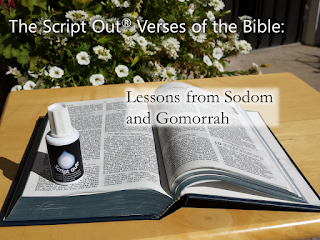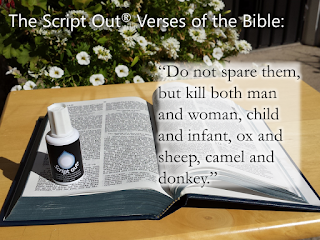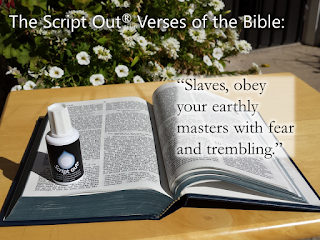Hespeler, 15 November, 2015 © Scott McAndless
Genesis 19:1-13, Matthew 10:5-15, Isaiah 1:9-18
| I |
n late August, 2005, as we all remember, a powerful hurricane named Katrina made landfall on the southern coast of Louisiana. Katrina did a whole lot of damage, but no place was hit harder than the City of New Orleans. Many who surveyed the damage at the time gave the opinion that a great American city had simply been wiped off of the map. It was positively apocalyptic.
As always happens in the face of that kind of tragedy, there was a great deal of soul searching and people asking why. Why did this happen? And there were lots of answers that were offered. Climate change and weather, the failure of the levees was blamed on the army corps of engineers, the failings of disaster assistance were blamed on the Federal Emergency Management Agency. But by far the clearest answer to the whyquestion was given by a Christian evangelist by the name of John Hagee. Hagee declared that the cause of the disaster was obvious. It was God’s judgement. In particular, he stated, it had happened because some sort of Gay Pride parade had been planned in the French Quarter of the city. The hurricane had been sent by God to stop it.
And what was the proof that Hagee offered for his explanation. He pointed to an announcement of such a parade that apparently was not really known to anybody else and appeared in no major newspapers. And he pointed to the Book of Genesis and the story of the destruction of the cities of Sodom and Gomorrah. That, as far as he was concerned, was proof enough.
Lots of people disagreed with him, of course. But everyone knew exactly what he was talking about. It has long been taken for granted by many that the meaning of that story is perfectly clear and that the Bible clearly says that God destroyed those two cities on purpose and that he did it specifically because of homosexuality. Because of that association, the story has become a rather uncomfortable story for many of us which means that we tend to ignore it and not think about it too mu
ch and that is not a good thing. It is a powerful and deeply meaningful story and it is a shame to lose that power and leave it in the hands of those who would use it to advance their own agendas. It is a story about consequences and it is important to talk about the consequences of our actions and choices. But in the hands of people like Hagee, only a small minority of people is singled out for blame – only they have to be responsible for their actions. Is that how the Bible really intended for us to read this story?
The story of Sodom and Gomorrah is mentioned often in the Scriptures and is generally held up in the Bible as an example of the kind of consequences we may have to deal with if we make bad choices. As such, the story is applied to many different situations. One excellent example is a passage in the book of the prophet Ezekiel. The prophet is criticizing the city of Jerusalem and does so by saying that it is like a sister to the doomed city of Sodom. “This was the guilt of your sister Sodom:” he says, “she and her daughters had pride, excess of food, and prosperous ease, but did not aid the poor and needy. They were haughty, and did abominable things before me; therefore I removed them when I saw it.” (Ezekiel 16:49-50)
So clearly, as far as Ezekiel was concerned, Sodom’s problems were about how food was shared and about the growing gaps between the rich and the poor. And it was also clear to him that Sodom’s problems were not unique to Sodom and certainly not to some sort of minority in the city that they tolerated. He is warning the people of Jerusalem that they are like Sodom. That suggests to me that any interpretation of this story that limits its application to other people, to people not like us, is just not going to be good enough.
The only real indication of what was wrong in Sodom that is given in the Book of Genesis is the way that the city treats a couple of angelic visitors. They arrive as strangers in the city and seem to be fully intent on spending the night sleeping in the town square. But one citizen, a man named Lot, doesn’t want them to do that and insists that they come to his house to stay instead.
In ancient Mediterranean society, it was generally believed that, if a stranger appeared at your door or in your village, you had a moral obligation to offer them a place to stay. It was a divineobligation and there were many stories told in many different religions about people who welcomed strangers and discovered, to their surprise, that they were actually hosting gods or other heavenly beings. There are stories like that in the Bible too and this story of Lot and the angels is one such story (though this one certainly has a less happy ending than some of the others).
So Lot takes the strangers home as his guests. As their host he owes them certain things under the hospitality laws of that time and place. Above all he owes them protection and security – he must protect them with his own life if necessary. This part quickly becomes very important because the men of the town soon hear of the strangers among them and gather to attack them.
The threat that these men pose to the strangers is the source of the connection that has historically been made between this story and things like gay pride parades. The men of Sodom come to Lot’s door and say, “Where are the men who came to you tonight? Bring them out to us, so that we may know them.”
That doesn’t sound too bad. “We just want to get to know them.” But you need to realize that that verb, to know, had a very particular meaning in ancient Hebrew. It meant to know someone reallyintimately. It was, in fact, a term that was commonly used for sexual relations.
So, no, when these men ask to “know” the guests in Lot’s house, it is no idle or innocent request. They are seeking to rape them. Because they are men and the angels they want to rape are male, that is where the whole association with homosexuality came from. But you do need to understand that the kind of rape that is threatened in this passage doesn’t actually have anything to do with sexual desire.
We have come to understand that rape in general is not a crime of sexual desire but rather a crime of power, violence and domination. Not everyone realizes this, but men usually do not rape women because they are driven mad with sexual desire but rather because they want to impose dominance or power over them. So really, any discussion about rape is quite separate from any discussion about consensual sex.
But this story is not even just about common rape. When a large group of people overpower a few weaker victims (either of the same sex or the opposite sex), that is called gang rape. And gang rape is and has long been a terrible feature of life in this world. It is particularly common in times of war and, as such, it has been extensively studied by historians and sociologists. They conclude that this kind of rape, in particular, is primarily a tactic – and sometimes a conscious military tactic – of domination, intimidation, dehumanization and control. It very clearly doesn’t have anything to do with sexual desire and those who participate in it do so entirely without reference to their own sexual orientation.
And I think that is quite clearly what these men of Sodom are doing – they are seeking to dominate these strangers who have come to Lot’s house. They are, of course, quite despicable, abominable and immoral to seek to do this and deserve all sorts of condemnation for it (as do all rapists and gang rapists).
But their intended actions in this story do not tell us anything about what we would refer to today as their “sexual orientation.” Indeed, the concept of sexual orientation is a very modern one that would not have made any sense to ancient people. And while you could very well use this story to criticize people for engaging in rape or gang rape, this story doesn’t really have anything at all to say (either positive or negative) about adults who engage consensually in sex.
That is why I say that people who use this passage to lay the blame for Katrina or for any other disaster or misfortune at the feet of people because of their orientation or because of anything they engage in consensually are totally misusing the passage. In fact, to use this passage to challenge anyone but ourselves as readers of this passage is a very unbiblical reading. The prophet Ezekiel used the story of Sodom and Gomorrah to challenge the Jews of his own time to think about how the people of Jerusalem, his own people, failed to take care of the weakest and poorest people among them – that is how the Bible teaches us to use this passage.
I also find the ways that Jesus used the story of Sodom and Gomorrah to be rather informative. I went looking through the gospels and was kind of surprised at how often Jesus did bring the story up. But, as often as he brought it up, it was never about singling out some group who were different from his own group. It was always about what was wrong with the entire generation.
The passage that we read from the Gospel of Matthew this morning is a great example. It comes as Jesus is sending his disciples out to the various towns and villages of Galilee and he has been careful to send them out in pretty much the same condition as the two angels arrived in Sodom, as poor beggars who arrive with nothing – no gold, or silver, or copper, no bag, or change of clothes, or sandals, or staff.
He is sending them out to share the good news and to bring healing and hope to the people, but he is also sending them out as a test of the whole generation. As they arrive, poor strangers in these Galilean towns, how they are received will reveal the true nature of the generation. If they are received as honoured guests according to the laws of hospitality that is a sign that the kingdom of God has indeed drawn near. If however they are received without hospitality, it will be a sign that this generation has reentered the evil age of Sodom: “it will be more tolerable for the land of Sodom and Gomorrah on the day of judgment than for that town.”
That is how we need to be using this story. It is meant to help us look at the society of which we are part. In particular, it is supposed to help us look critically at how we personally contribute to how our society treats outsiders, people who don’t fit into our neat little notions of what is acceptable and not acceptable. And it is especially about how we treat the poor and the strangers.
It is a shame that, because this particular story of Sodom and Gomorrah makes us feel uncomfortable, that we have been unwilling to give it our attention. By failing to deal with the story we have essentially left it to those who are only too happy to use it to advance their own agenda and attack whichever particular groups they have wanted to.
In the extreme case, this is the kind of thinking that makes religious terrorists (such as those who claim responsibility for Friday’s attacks in Paris) feel that they are justified – that they are God’s hand of judgement against the immorality of a city or a nation. The whole world sees today the disgusting place such thinking leads us to.
The story of Sodom and Gomorrah is not about whatever annoys us about other people. It is about what we need to do to welcome and give a place to those who we may struggle with because they are different from us. If this story isn’t doing that for you, you might just be reading it wrong.









